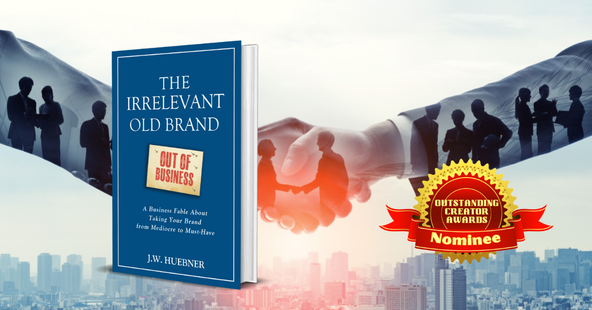|
Score: 93/100 (9.3 out of 10)
There are books that are practical and there are books that are entertaining, then there are books like The Irrelevant Old Brand that manage to be both. The Irrelevant Old Brand by Jim Huebner is a fictionalized account of a tired, old business that seems to be in the twilight of its lifespan, failing to keep up with trends and growing competition. This is, ironically, a very relevant book as we've seen many businesses bow out during the course of the pandemic. Even former powerhouses like K Mart, Sears, Toys R Us, and Blockbuster saw a steep decline after the turn of the century, largely due to the growing popularity of online shopping and streaming services. The fact of the matter is, you either stay relevant and adapt or you go the way of the dodo (extinct). That's one of the major points of the book and the meaning behind its title. However, the book is about more than that. It's about learning good business, maximizing strengths and limiting weaknesses in a work environment. This book is most like The Goal by the great Eliyahu Goldratt, both in that it's a lesson about business taught via a fictitious story and in its overall story. The book follows a disgruntled, old business owner named Bob as he seeks the aid of a business consultant named Peter, the book's protagonist. Through a series of interviews with the workers in the business, Peter is able to not only figure out what's going wrong with it, but also learns a few things himself (along with the audience). The audience will learn about the three P's of marketing: placement (distribution), product (in relation to quality), and price (in relation to value). You also learn about the pillars of a relevant brand, seen in the acronym GIVE: grateful and generous, inspired difference, value exceeds price, and endless quest. The one that stood out to us the most was the first one: G- grateful and generous. Customers and clients remember the businesses that took care of them and were good to them, even if it means paying a little more. This book is incredibly concerned with one key thing: value and the consumer satisfaction it brings. Peter continually emphasizes that people will pay more for a product that is well-built, safe, ships fast, and fresh as opposed to one that lacks heart and soul yet is cheaper. And that's not to say that this book is simply one big business lecture. It actually has human elements as well. For example, Bob's good reputation in the small town is very evident in the way he is looked at and is treated. His name is even listed as a sponsor for the local baseball team and he's a beloved patron of the local restaurant. There are some grittier, human moments as well like when Mary laughs about something exploding in the microwave or when there's a sudden, unexpected tragedy that shakes the workers to their core. There are also subtle things like descriptions of the way the BBQ smell sticks to you that make this story seem real. There are some small things that hold it back. Perhaps the most annoying thing about the book is that it lack indentations for new paragraphs and pieces of dialogue. It can be an eyesore at times, but it's not too bad. All in all, if you enjoyed The Goal by Elijah Goldratt, you will definitely enjoy and learn a lot from this book. Check it out on Amazon!
0 Comments
Leave a Reply. |
Archives
July 2024
Categories |

 RSS Feed
RSS Feed